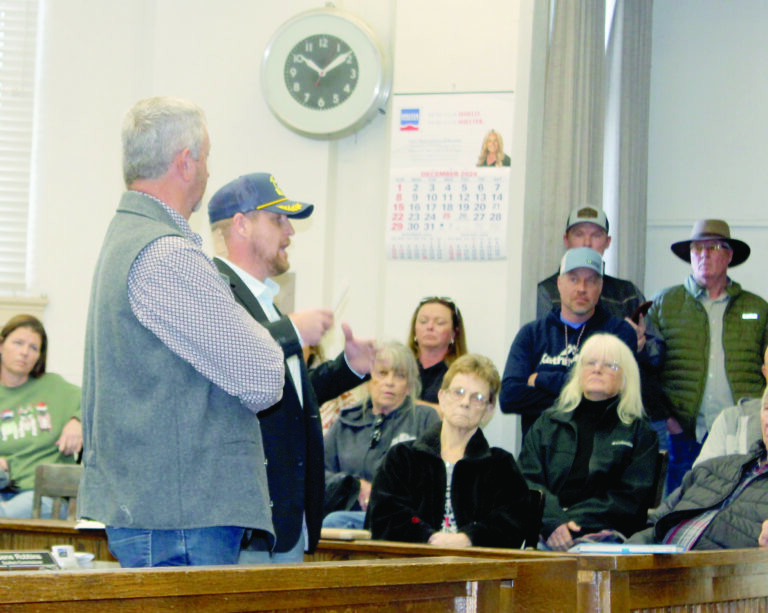Tense debate over poultry farm

BY MURRAY BISHOFF Special to the Cassville Democrat
Sharp exchanges and misinformation fueled a meeting at the Barry County Courthouse on Dec. 9 as neighbors and Barry County officials grappled with a proposal to build another poultry farm south of Aurora.
Unlike hundreds of poultry operations already running in the county, this proposals appeared to outline the largest to date. According to a letter distributed by county resident Lauren Tucker, the proposal called for 68 poultry houses located on 527 acres at Hwy. 39 and Farm Road 1200. Tucker characterized the proposal as a threat to local water supplies, pollution, and the introduction of workers that could “change our quality of life, our land and its value forever.”
Armed with this background, around 200 people packed the historic courtroom to face down 158th District State Rep. Scott Cupps, R-Shell Knob, Barry County Presiding Commissioner Steve Blankenship, Northern Commissioner Gary Schad and Southern Commissioner Gene Robbins over how to stop the plan.
Cupps started the meeting by chiding the audience for gathering based on misinformation. That prompted a shouting exchange between him and Tucker, who admitted distributing the letter, then overrode Cupps’ objections by shouting, “You work for us!”
Regrouping, Cupps established that Tucker’s letter misstated the proposal, which called for “6 to 8” poultry houses, not 68. Then, he walked the audience through the process for how the Missouri Department of Natural Resources handles such plans, requiring a land disturbance permit, a nutrient management plan for handling the poultry litter, and a stormwater protection permit before they could begin operations.
Cupps said even financing to purchase the land was contingent upon getting those permits.
Part of the confusion stemmed from the proposed buyer, Veronabased Hram Cung Farms, not being present, and the family spokesperson was challenged by a language barrier. Cupps said the family farming operation had several other poultry houses on other Barry County farms.
Moreover, Cupps stressed Missouri Department of Natural Resources (DNR) had restrictions on poultry operations that were significantly more stringent than for cattle. Grassland Consultants, a dairy farming business with an office in Monett but is owned by a New Zealand company, owned the land for 20 years. By one report, they were running 800 cattle on 600 acres, more than the recommended oneacre- per-cow, without a manure management plan because they had been grandfathered in before current regulations began. Cupps called the new scenario “exponentially better” than how the land has been used.
At some point, that prompted a “Two wrongs don’t make a right” comment from the still dissatisfied audience.
Cupps tried to deflect the antagonism about foreign owned businesses by recalling the Missouri General Assembly made a law that foreign companies could not own businesses in the state, like Smithfield Foods having been purchased by a Chinese conglomerate, forcing divestiture of that company back into Missouri hands. Hram Cung Farms, he declared, is “a family farming operation based in Barry County, with Barry County residents who are US citizens.”
Stacy Fink, member of a longstanding Barry County farming family who lives in St. Louis, tried to reinforce some of Cupps’ arguments from her contacts with DNR on the subject. She said Hram Cung Farms had applied for the general land disturbance permit but did not have to initially apply for the two others immediately.
For her efforts, Fink received a response from the crowd, declaring, “Go back to St. Louis.”
Cupps apparently overstated his case by implying the three permits had been approved, and that the farm would be locked into eight houses for the duration of owning the land. He added even financing to purchase the land was contingent upon getting those permits and a contract with Tyson Foods, which had not yet taken place.
According to an email received by Tucker from Teresa Bullock in DNR’s operating permits section, Hram Cung Farms had not yet filed for a nutrient management permit and could apply to expand the number of poultry houses “in accordance with the Missouri Clean Water Law and associated rules and regulations.”
Presiding Commissioner Steve Blankenship sought to reassure the audience that regulations from the county health department would guide construction of new wells. Neighbors worried that their wells could dry up from a major new draw. Cupps asserted there are hundreds of wells in Barry County operating continually. He said that eastern Barry County sits over the Roubidoux aquifer, which extends to the Mississippi River, ensuring that properly built wells will not run dry.
Worries surfaced about pollution reaching as far as Crane, to the only stream holding natural rainbow trout in Crane, 10 miles away, and to Table Rock Lake from algae blooms fueled by uncontrolled disbursement of poultry litter, which is high in nitrogen and phosphorous. Other concerns came from Tucker’s letter, where she understood Mrs. Cung Mang to say the farm planned to place 20 trailer homes for laborers. That morphed into importing Laotian immigrants, to which one person declared, “With migrant workers, crime rates always go up. What’s to stop them?”
Cupps declared the farm was not bringing in migrant workers. Construction on the property to the north, which Blankenship identified as the T&R Ranch, was unrelated to the Hram Cung Farms.
Contacted for this story, Tommy Newman, the T&R Ranch owner, said he chose not to attend the meeting on the advice of legal counsel.
“I bought 20 acres because I liked the location,” he said. “I’ve got the Amish there now building a 900 square foot house that will be for sale. I am not affiliated with those other people. My ranch is nowhere around there. I live in Verona.”
He described the organized opposition as “a bunch of hot-heads,” adding, “If I knew for sure Monett was running off Tyson and building a big chicken complex with 68 chicken houses, I’d have been down there yelling and screaming too.”
Concern was also expressed that the Hram Cung Farms was affiliated with a church and would try to operate tax free. The organization is listed with the Missouri Secretary of State as a limited liability corporation, not a non-profit or religious organization.
Neighbors nonetheless wanted the operation stopped. Cupps responded that Missouri’s Right to Farm constitutional amendment, passed in 2014, stripped counties and the state government of any authority to regulate farming on private land beyond basic environmental restrictions.
“Be careful what you wish for,” injected Schad, on the impact of Right to Farm.
Cupps stressed that his job as a legislator was to see that laws were on the books to protect the public. He described how he and 159th District State Rep. Dirk Deaton, R-Noel, from McDonald County crafted a new law that restricts waste disposal that only recently took effect, impacting firms like Denali Water Solutions.
“DNR is not the law,” he said. “What I am committing to you is our state departments – the Secretary of State or the Department of Economic Development – they are following the law as applied to this particular situation.”
For her part, Tucker said she was not satisfied and was “still fighting.” She had contacts with the office of State Sen. Mike Moon, R-Ash Grove, the US Fish and Wildlife Service aand other agencies in an effort to stop construction of any poultry operation there.





